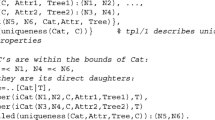Abstract
A novel approach to the parsing of natural language based on weighted constraints is presented. Wellformedness conditions are exclusively expressed by means of constraints and no generative rule component is available. In general, constraints can be violated and contradictory requirements of a grammar are tolerated. Additional representational levels allow the integration of different linguistic perspectives into a coherent model, thus contributing jointly to the computation of the most plausible structural interpretation. A number of solution procedures is available for such a parsing problem. Their properties are discussed with respect to possible analogies to human language processing, focussing on robustness against deviating utterances and external temporal pressure.
Zusammenfassung
Der Beitrag beschreibt einen neuartigen Ansatz zur Strukturanalyse natürlicher Sprache auf der Basis gewichteter Constraints. Unter völligem Verzicht auf eine generative Regelkomponente werden jegliche Bedingungen an die Wohlgeformtheit einer sprachlichen Struktur mit Hilfe von Constraints ausgedrückt. Constraints sind grundsätzlich verletzbar und daher auch in der Lage, widersprüchliche Forderungen der Grammatik zu tolerieren. Über zusätzliche Repräsentationsebenen können sehr unterschiedliche linguistische Phänomenbereiche in die Modellierung einbezogen werden und so ihren spezifischen Beitrag zur Ermittlung der plausibelsten Interpretation einer Äußerung leisten. Für ein derartig definiertes Parsingproblem existieren verschiedene Lösungsverfahren, deren Eigenschaften insbesondere im Hinblick auf mögliche Parallelen zur menschlichen Sprachverarbeitung diskutiert werden. Im Mittelpunkt steht dabei die Robustheit gegen abweichende Äußerungen, sowie gegen zeitlichen Verarbeitungsdruck.
Similar content being viewed by others
Literatur
Abney, S. (1996) Partial parsing via finite-state cascades. In: Proc. ESSLLI Workshop on Robust Parsing
Boddy, M. & Dean, T.L. (1994) Deliberation scheduling for problem solving in time-constrained environments. Artificial Intelligence, 67(2), 245-285
Duchier, D. & Debusmann, R. (2001) Topological dependency trees: A constraint-based account of linear precedence. In: Proceedings 39th/10th Annual Meeting of the ACL/EACL, pp. 180–187, Toulouse, France
Foth, K., Menzel, W. & Schröder, I. (2000) A transformation-based parsing technique with anytime properties. In: Proc. 4th Int. Workshop on Parsing Technologies, pp. 89–100, Trento, Italy
Harper, M.P., Jamieson, L.H., Mitchell, C.D., Ying, G., Potisuk, S., Srinivasan, P.N., Chen, R., Zoltowski, C.B., McPheters, L.L., Pellom, B. & Helzerman, R.A. (1994) Integrating language models with speech recognition. In: Proceedings of the AAAI-94 Workshop on the Integration of Natural Language and Speech Processing, pp. 139–146
Harper, M.P. & Helzermann, R.A. (1995) Extensions to constraint dependency parsing for spoken language processing. Computer Speech and Language, 9(3), 187–234
Heinecke, J., Kunze, J., Menzel, W. & Schröder, I. (1998) Eliminative parsing with graded constraints. In Proceedings 17th International Conference on Computational Linguistics, 36th Annual Meeting of the ACL, Coling-ACL ’98, pp. 526–530, Montreal, Canada
Helzerman, R.A. & Harper, M.P. (1992) Log Time Parsing the MasPar MP-1. In: Proceedings of the 6th International Conference on Parallel Processing,, pp. 209–217
Hobbs, J.R., Appelt, D., Bear, J., Israel, D., Kameyama, M., Stickel, W. & Tyson, M. (1996) Fastus: A cascaded finite-state transducer for extracting information from natural-language text. In: Roche and Schabes, Eds., Finite State Devices for Natural Language Processing. Cambridge MA: MIT Press
Karlsson, F., Voutilainen, A., Heikkilä, J. & Anttila, A., Eds. (1995) Constraint Grammar — A Language-Independent System for Parsing Unrestricted Text. Berlin, New York: Mouton de Gruyter
Maruyama, H. (1990) Structural disambiguation with constraint propagation. In: Proceedings 28th Annual Meeting of the ACL, pp. 31–38
Mellish, C. (1989) Some chart based techniques for parsing ill-formed input. In: Proceedings 27th Annual Meeting of the ACL, pp. 102–109, Vancouver
Menzel, W. (1998) Sehen und Verstehen: Der Beitrag bildlicher Information zur robusten Sprachverarbeitung. In: Tagungsband 28. Jahrestagung der Gesellschaft für Informatik, Magdeburg, pp. 161–170, Berlin: Springer-Verlag
Menzel, W. & Schröder, I. (1998a) Constraint-based diagnosis for intelligent language tutoring systems. In: Proceedings IT & KNOWS, XV. IFIP World Computer Congress, pp. 484–497, Vienna und Budapest
Menzel, W. & Schröder, I. (1998b) Decision procedures for dependency parsing using graded constraints. In: S. Kahane & Alain Polguère, Eds., Proc. Coling-ACL Workshop on Processing of Dependency-based Grammars, pp. 78–87, Montreal, Canada
Menzel, W. & Schröder, I. (1998c) Model-based diagnosis under structural uncertainty. In: Proceedings 13th European Conference on Artificial Intelligence, pp. 284–288, Brighton, UK
Pollard, C. & Sag, I.A. (1994) Head-Driven Phrase Structure Grammar. Chicago: The University of Chicago Press
Prince, A. & Smolensky, P. (1993) Optimality theory: Constraint interaction in generative grammar. Technical Report 2, Center for Cognitive Science, Rutgers University
Schröder, I., Menzel, W., Foth, K. & Schulz, M. (2000) Modeling dependency grammar with restricted constraints. Traitement Automatique des Langues (T.A.L.), 41(1), 97–126
Schröder, I., Pop, H.F., Menzel, W. & Foth, K. (2001) Learning grammar weights using genetic algorithms. In: Proceedings Euroconference Recent Advances in Natural Language Processing, pp. 235–239, Tsigov Chark, Bulgaria
Schulz, M. (2000) Parsen natürlicher Sprache mit gesteuerter lokaler Suche. Diplomarbeit, Fachbereich Informatik, Universität Hamburg
Traxler, M.J., Pickering, M.J. & Clifton, C. (1998) Adjunct attachment is not a form of lexical ambiguity resolution. Journal of Memory and Language, 39, 558–592
Trueswell, J.C., Tanenhaus, M.K. & Garnsey, S.M. (1994) Semantic influences on parsing: Use of thematic roles information in syntactic ambiguity resolution. Journal of Memory and Language, 33, 285–318
Tsang, E. (1993) Foundations of Constraint Satisfaction. London: Academic Press
Author information
Authors and Affiliations
Corresponding author
Additional information
Die hier vorgestellten Forschungen wurden von der Deutschen Forschungsgemeinschaft unter den Aktenzeichen Me 1472/1-1, Ku 811/3-1 und Me 1472/1-2 gefördert
Rights and permissions
About this article
Cite this article
Menzel, W. Parsing mit inkonsistenten Grammatiken. Kognit. Wiss. 9, 175–184 (2002). https://doi.org/10.1007/BF03354951
Published:
Issue Date:
DOI: https://doi.org/10.1007/BF03354951




